After the golden gaming days of the pandemic, the industry is in a difficult transition. Against this backdrop, it appears that some of the biggest companies want even more of the secondary accessory market territory – this will inevitably reduce choice and cost loyal gamers whose budgets are already stretched.
Gamers’ hands are tied by ‘official’ controllers
The big console makers Sony and Microsoft are attempting to get a firmer grip on the hardware accessories market. In Europe, 58% of gamers play on consoles, with Sony’s PlayStation and Microsoft’s Xbox as the two major global players in this market. Nintendo’s hybrid Switch console is also incredibly popular, but owners will often have a Xbox or PlayStation as well their Switch.
Microsoft came under scrutiny at the end of last year when some Xbox owners got warning notices about some non-Xbox accessories like controllers that they were using.
Players using these were told that their connected accessory was not authorized even though many had been using these compatible add-ons without problems for some time. They were then given two weeks to replace the ‘non-authorized’ accessory. They were told that after that time, the controller or adaptor would stop working.
Here’s the message users received:
“Using unauthorized accessories compromises your gaming experience. For this reason, the unauthorized accessory will be blocked from use on 12/11/2023. For help returning it, check with the store it came from or contact the manufacturer.
To see authorized accessories, go to to www.xbox.com/accessories. (0x82d60003)”
This was a significant move from Microsoft as it impacts any accessory that isn’t original or hasn’t passed through the certification required by Xbox which would deem it to be ‘authorized’.
Spanish consumer organisation OCU investigates the small print
Euroconsumers Spanish member OCU looked at what information consumers had in the Xbox console packaging to see if this sudden change of policy was obvious or fair. They found that for Xbox One all the product packaging information says about accessory compatibility is to “look for games and accessories designed for Xbox One”. There is no mention of them having to be original or authorized.
For an Xbox Series X purchased in 2023, the same year that players were told to replace their non-compliant devices, said only to “look for games and accessories compatible with Xbox Series X”. Again, there is no indication they must be original or authorized.
Anyone buying a console would not know at that time that the manufacturer would block uncertified third-party controllers in the future. This could be an unfair commercial practice as the manufacturer is obliged to provide the necessary information in the product packaging when it’s purchased.
What the controller purchase test showed:
The team at OCU then tested out what happens when an ‘unofficial ’ but ‘compatible’ controller was used with an Xbox. They purchased a controller on Amazon and got the same error message as gamers did, warning them that its use would be blocked and a replacement was required. However, the controller was (and still is) advertised on Amazon as “compatible with Xbox” so a consumer would naturally assume it’s ok to use.
Additional accessories purchase test:
The team looked at USB-keys that allow someone to use say a PS4, PS5 or other controller with an Xbox when they connect wirelessly. These USB-keys also allow you to use a mouse and keyboard. They found that USB-keys that allow players to use different input devices with an Xbox were also blocked.
Some gamers also use quite expensive steering wheels to simulate driving controls in driving games – there are a few certified devices available but many are not despite being a common, fair to use accessory.
Additionally, up until very recently only Microsoft’s own controllers could be used wirelessly with the Xbox, but Microsoft have now begun the Xbox certification scheme for wireless controllers.
Consumers not fully informed
Up until now, people could play with uncertified third-party controllers and with other accessories which did not have to be licensed by Microsoft. The information provided set out the need to use compatible games and accessories, but did not specify they had to be licensed. Sellers of the third-party accessories were also caught out.
Examining the claims: does Microsoft have a point?
But even if the products would clearly indicate to consumers not to be compatible with the official Xbox, does this make it ok to block out third party devices?
Microsoft’s website gives more clues as to their justification for the move:
“Microsoft and other licensed Xbox hardware partners’ accessories are designed and manufactured with quality standards for performance, security, and safety. Unauthorized accessories can compromise the gaming experience on Xbox consoles (Xbox One, Xbox Series X|S).
https://support.xbox.com/en-US/help/errors/error-code-0x82d60003“
Combined with the error message about gaming quality, the statements from Microsoft suggest that some devices are being blocked because they include those that enable players to get an advantage in multi-player games, and some under the frustratingly broad category of ‘security’.
Is security trumping the consumer’s fair choice?
So is Microsoft justified in blocking accessories for these reasons? Or is the security argument being (mis) used to the benefit of big players?
Let’s look first at accessories that help in competitive game play which obviously takes place over an online, live connection with others. Here, most gamers would agree that it makes sense to restrict tools that could give one player a competitive advantage over another.
Where the stakes are high in online multi-player shooting games like Call of Duty, a mouse and keyboard give a much more precise target and aim over a controller. Gamers aren’t in favour of their opponents using a keyboard and mouse when they’re playing a console game. While this reason seems legitimate, it’s a blanket restriction that could also restrict other fair use by those accessories and there are doubts that the restrictions actually work:






